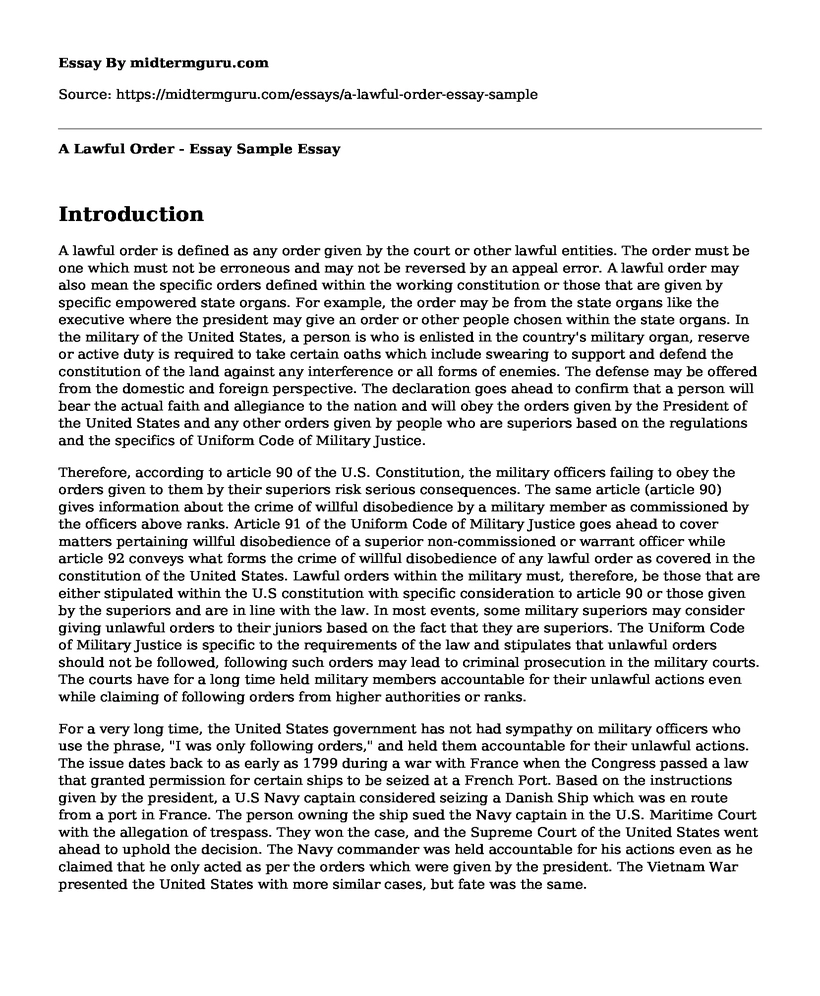Introduction
A lawful order is defined as any order given by the court or other lawful entities. The order must be one which must not be erroneous and may not be reversed by an appeal error. A lawful order may also mean the specific orders defined within the working constitution or those that are given by specific empowered state organs. For example, the order may be from the state organs like the executive where the president may give an order or other people chosen within the state organs. In the military of the United States, a person is who is enlisted in the country's military organ, reserve or active duty is required to take certain oaths which include swearing to support and defend the constitution of the land against any interference or all forms of enemies. The defense may be offered from the domestic and foreign perspective. The declaration goes ahead to confirm that a person will bear the actual faith and allegiance to the nation and will obey the orders given by the President of the United States and any other orders given by people who are superiors based on the regulations and the specifics of Uniform Code of Military Justice.
Therefore, according to article 90 of the U.S. Constitution, the military officers failing to obey the orders given to them by their superiors risk serious consequences. The same article (article 90) gives information about the crime of willful disobedience by a military member as commissioned by the officers above ranks. Article 91 of the Uniform Code of Military Justice goes ahead to cover matters pertaining willful disobedience of a superior non-commissioned or warrant officer while article 92 conveys what forms the crime of willful disobedience of any lawful order as covered in the constitution of the United States. Lawful orders within the military must, therefore, be those that are either stipulated within the U.S constitution with specific consideration to article 90 or those given by the superiors and are in line with the law. In most events, some military superiors may consider giving unlawful orders to their juniors based on the fact that they are superiors. The Uniform Code of Military Justice is specific to the requirements of the law and stipulates that unlawful orders should not be followed, following such orders may lead to criminal prosecution in the military courts. The courts have for a long time held military members accountable for their unlawful actions even while claiming of following orders from higher authorities or ranks.
For a very long time, the United States government has not had sympathy on military officers who use the phrase, "I was only following orders," and held them accountable for their unlawful actions. The issue dates back to as early as 1799 during a war with France when the Congress passed a law that granted permission for certain ships to be seized at a French Port. Based on the instructions given by the president, a U.S Navy captain considered seizing a Danish Ship which was en route from a port in France. The person owning the ship sued the Navy captain in the U.S. Maritime Court with the allegation of trespass. They won the case, and the Supreme Court of the United States went ahead to uphold the decision. The Navy commander was held accountable for his actions even as he claimed that he only acted as per the orders which were given by the president. The Vietnam War presented the United States with more similar cases, but fate was the same.
Conclusion
Following the discussed, a lawful order to the military is first an order which is within the stipulations of the law and given by persons authorized by the constitution. Such people may be officers from senior ranks, the organs of the executive, the legislature, and judiciary to mention but a few. In the event an officer considers committing an act which is unlawful then the officer is considered responsible for his or her actions and must be prosecuted in the military courts. Article 91 paragraph 2 also supports my argument by confirming that a lawful order is one which is given by any warrant officer. Therefore, if a person assaults or strikes a noncommissioned officer while the officer is in or out of the execution of his or her office, the assault is considered unlawful and can be prosecuted. The article and paragraph go further to mention that treating such officers with contempt or disrespect shall be punished in the U.S. Court Martial. Other officers covered in the chapter are the petty officers and those appointed by the president or state-mandated individuals to mention but a few. Article 91 and paragraph 2, therefore, gives many powers to the U.S. Court Martial as the main arbitrator in most of the military cases. Other cases may reach the level of the Supreme Court though in most events the decisions made by the Court Martial are usually upheld at the level of the Supreme Court.
Cite this page
A Lawful Order - Essay Sample. (2022, Sep 23). Retrieved from https://midtermguru.com/essays/a-lawful-order-essay-sample
If you are the original author of this essay and no longer wish to have it published on the midtermguru.com website, please click below to request its removal:
- Security Plan for Wal-Mart Paper Sample
- Effects of the Legal Aid Sentencing and Punishment of Offenders Act
- Responsibility of Vendors to Timmys Accident - Paper Example
- Paper Example on Protecting the Youth From Challenges of Stop and Search Policies
- Juvenile Delinquency & Adult Crime: Exploring the Link - Essay Sample
- Rupert Murdoch: From Billionaire Media Mogul to Scandal-Hit Businessman - Essay Sample
- US: High Crime, High Inequality - Ecological Theory Explains Why - Essay Sample







